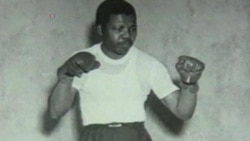JOHANNESBURG —
The sporting world has been paying tribute to former South African president Nelson Mandela since his death last week.
Sports played a key role in the fight against apartheid and, in the years that followed, the end of white minority rule.
In the black township of Sharpeville in 1960, South African security forces shot dead 67 people who were protesting new apartheid laws. In response, the International Olympic Committee banned South Africa from the Games. It was the start of a long battle between apartheid and sports.
Another flashpoint came four years later, when Basil d'Oliveira, a mixed-race South African cricketer, was selected by English club team the MCC to tour his homeland. Mixed-race teams were banned in South Africa.
Then South African Prime Minister John Vorster strongly defended segregation and the tour was abandoned.
"The team as constituted now is not the team of the MCC. It is the team of the anti-apartheid movement," Vorster said.
Anti-apartheid protestors targeted South African teams. Several major sports federations boycotted South Africa.
Speaking in 1995, Mandela described the power of the boycotts.
"Against sports they were really paralyzed," explained Mandela. "There was nothing that they could do. For them to be regarded as the polecat of the world and to be isolated from sports completely was one of the biggest blows against South Africa."
The end of apartheid prompted a rapid return to the international fold.
Dr. Ali Bacher, captain of the South African cricket team in 1969, says Mandela was visionary.
“He knew how important sport was to the people of this country. And ultimately when Nelson Mandela was released from prison, it was unbelievable what happened in this country," said Bacher. "The doors started to open.”
He added rugby and cricket, played mostly by white South Africans, were still seen as symbolic of apartheid. Then on home turf in 1995, South Africa beat the favored New Zealand All Blacks in the Rugby World Cup final.
Mandela, by then president, presented the trophy wearing the Springbok jersey. Bacher was there.
“The whole crowd were chanting ‘Nelson! Nelson! Nelson!’ They loved him.”
On the streets of townships like Soweto, black South Africans joined the celebrations. Rugby - once divisive - united the country.
Mandela helped South Africa win the right to host the 2010 FIFA World Cup and made his last public appearance at the final. And it was in the same Johannesburg stadium where, fittingly, South Africans bid their final farewell to the anti-apartheid hero in this week’s memorial.
Sports played a key role in the fight against apartheid and, in the years that followed, the end of white minority rule.
In the black township of Sharpeville in 1960, South African security forces shot dead 67 people who were protesting new apartheid laws. In response, the International Olympic Committee banned South Africa from the Games. It was the start of a long battle between apartheid and sports.
Another flashpoint came four years later, when Basil d'Oliveira, a mixed-race South African cricketer, was selected by English club team the MCC to tour his homeland. Mixed-race teams were banned in South Africa.
Then South African Prime Minister John Vorster strongly defended segregation and the tour was abandoned.
"The team as constituted now is not the team of the MCC. It is the team of the anti-apartheid movement," Vorster said.
Anti-apartheid protestors targeted South African teams. Several major sports federations boycotted South Africa.
Speaking in 1995, Mandela described the power of the boycotts.
"Against sports they were really paralyzed," explained Mandela. "There was nothing that they could do. For them to be regarded as the polecat of the world and to be isolated from sports completely was one of the biggest blows against South Africa."
The end of apartheid prompted a rapid return to the international fold.
Dr. Ali Bacher, captain of the South African cricket team in 1969, says Mandela was visionary.
“He knew how important sport was to the people of this country. And ultimately when Nelson Mandela was released from prison, it was unbelievable what happened in this country," said Bacher. "The doors started to open.”
He added rugby and cricket, played mostly by white South Africans, were still seen as symbolic of apartheid. Then on home turf in 1995, South Africa beat the favored New Zealand All Blacks in the Rugby World Cup final.
Mandela, by then president, presented the trophy wearing the Springbok jersey. Bacher was there.
“The whole crowd were chanting ‘Nelson! Nelson! Nelson!’ They loved him.”
On the streets of townships like Soweto, black South Africans joined the celebrations. Rugby - once divisive - united the country.
Mandela helped South Africa win the right to host the 2010 FIFA World Cup and made his last public appearance at the final. And it was in the same Johannesburg stadium where, fittingly, South Africans bid their final farewell to the anti-apartheid hero in this week’s memorial.





